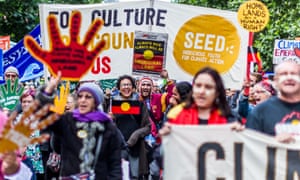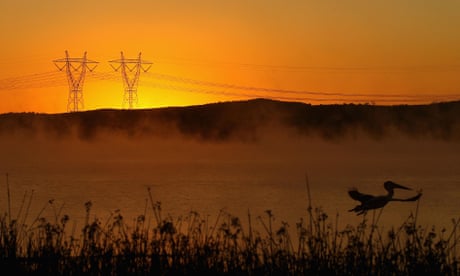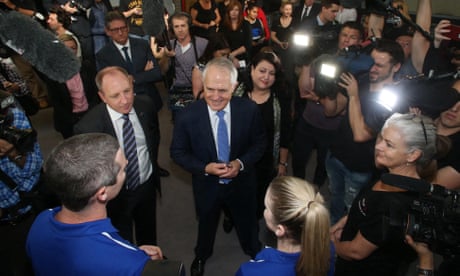Galaxy polling finds only 17% of voters think the Coalition has a credible climate plan and only 20% think Labor does
 |
| Protesters in favour of action on climate change in Melbourne. The Climate Institute found the Greens' and Glenn Lazarus Team's policies on climate change were the strongest and most credible. Photograph: Ratnayake/Rex Shutterstock |
Despite that, voters were dissatisfied with both Labor and Coalition policies, with only 17% saying the Coalition had a credible climate plan and only 20% saying Labor did.
Those findings fitted with an assessment of the main parties' policies conducted by the Climate Institute, which concluded the Coalition plan was "currently inadequate" and Labor's merely had "pathways to credibility".
They found the Greens' and Glenn Lazarus Team's policies on climate change were the strongest and most credible.
 Concern about climate change rose significantly since the last federal election, from 53% in 2013 to 72% in 2016.
Concern about climate change rose significantly since the last federal election, from 53% in 2013 to 72% in 2016.Concern among Coalition voters jumped the most, from 41% in 2013 to 62% now.
But uncommitted voters were the most likely to be concerned about climate change, with 76% of them either "fairly" or "very" concerned, according to the national polling of 1,100 people.
Almost two-thirds of respondents agreed Australia should be a world leader in finding solutions to climate change, up from 52% in 2012.
Only 23% thought Australia should wait for other countries before strengthening its post-2020 emissions targets.
And 60% of voters thought delaying action would cause shocks to jobs and energy supplies.
The Climate Institute also assessed what they described as the "credibility" of the parties contesting government or they thought were likely to be re-elected to the Senate.
Each of the six parties was assessed on the basis of their 2030 emissions reduction targets and their timeframe for achieving net zero emissions.
The Climate Institute also looked at the implications for global warming if all countries matched that party's targets and how Australia would rank on per capita emissions among the G20 if that party's policies were adopted.
The Greens and the Glenn Lazarus Team came out as being ranked equally among G20 nations, with their policies putting Australia eighth among G20 nations and causing a temperature rise of between 1.5C and 2C.
The Coalition was at the bottom of parties that had a climate policy, putting Australia at 18th spot among G20 nations and resulting in temperature rises of between 3C and 4C.
Labor performed better but wasn't consistent with keeping warming under 2C and left Australia at 15th among G20 nations.
The Nick Xenophon Team came out in the middle, doing better than Labor but not as well as the Greens.
The Jacqui Lambie Network was the worst, unable to be properly assessed since they don't have any targets.
John Connor, the chief executive of the Climate Institute, said the polling and assessments showed there was a clear opportunity for government develop constructive climate change and energy policies.
"Our research shows that all our political parties need to do more to develop policies that not only build credibility but also build community and investor confidence," he said.
"This is a critical finding, given that both major parties are promising key reviews next year amid greater domestic and international scrutiny."
 The Climate Institute called for three policy steps:
The Climate Institute called for three policy steps:• Pre 2050 net zero emission objectives, with credible emission reduction pathways and regular independent processes of review.
• Economic and community strategies to manage the transition to decarbonisation.
• Integration of climate risks and opportunity assessments into core decision making.
"After 10 turbulent years, Australian business and the voting public have tapped into international trends about the economic and environmental benefits of climate action," Connor said.
"Our main political parties urgently need to catch up."
Links

No comments :
Post a Comment